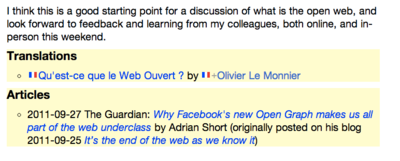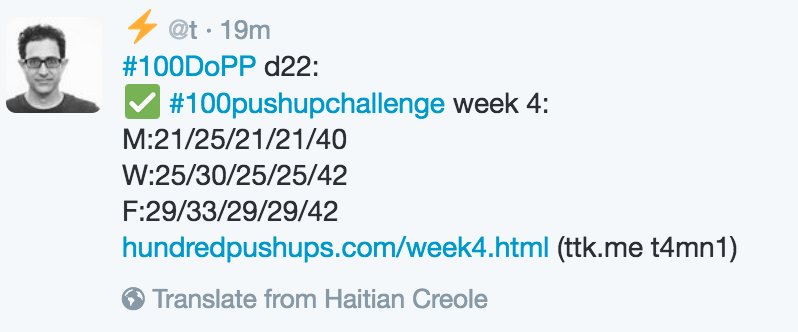translations
This article is a stub. You can help the IndieWeb wiki by expanding it.
translations are alternative versions of posts that have been translated (rewritten with the intent of maintaining meaning) into another language.
Why
By writing and posting a translation of a post in another language, you provide easier access (and understanding) those who are better able to read that language.
Similarly by linking to translations of your posts, you provide a way for those who prefer those translations to better what you wrote about.
How to
(stub) Display conventions for linking to alternate translations of one of your web pages?
How to markup
On the link to the translated article, use rel=alternate and hreflang="lang-code" attributes. If the link text is also in the translated language, use lang="lang-code" as well. The string "lang-code" is meant to be replaced by the ISO 639-1 language code for the translated language.
ISO 639-1 is surprisingly difficult to research due to the many standards in use. Useful resources include:
- List of ISO 639-1 Codes on wikipedia
- BCP47 on wikipedia
- IANA Subtag Listing (warning, this is verbose)
- … Add more here
If you have translated an article, it's sensible to make the original source aware of your translation, as they might want to add a link to it. One of the IndieWeb examples below uses u-translation-of microformat and sends a webmention to the original page.
IndieWeb Examples
Current Examples of IWC Translated Articles: Indieweb community members' posts and translated versions:
Tantek
 Tantek Çelik links to translations of his articles, e.g.:
Tantek Çelik links to translations of his articles, e.g.:
- original: What is the Open Web?
- translated into French by Olivier Le Monnier
I'm using lang="fr" hreflang="fr" rel="alternate" on a hyperlink to the translation, with link text of translated post title, in a section with heading "Translations" in the footer of the original post. I also have a stylesheet that automatically inserts a little flag graphic based on the translated language (value of the hreflang attribute) immediately before the link to the translation. - Tantek 18:08, 28 January 2013 (PST) (The yellow backgrounds in the image are from my <ins> styling and are not specific to the display of the translations.)
Aaron Parecki
 Aaron Parecki links to translations of his articles, e.g.:
Aaron Parecki links to translations of his articles, e.g.:
- original: Creating Content on the Indieweb
- translated into French by Christophe Ducamp
I'm using almost the same style as Tantek: lang="fr" hreflang="fr" rel="alternate" on a hyperlink to the translation, with link text of translated post title, in a section with heading "Translations" in the header of the original post on a yellow background. I also have a stylesheet that automatically inserts a little flag graphic based on the translated language (value of the hreflang attribute) immediately before the link to the translation. -Aaron Parecki 12:45, 31 January 2013 (PST)
Barnaby Walters
 Barnaby Walters links to translated versions of his articles, e.g.:
Barnaby Walters links to translated versions of his articles, e.g.:
- original: Chopped Up Or Cloned: You Choose
- translated into French by Christophe Ducamp
Right now I am simply including a link (annotated with rel=alternate and hreflang=fr) to the translation in a French-language paragraph inviting French readers to read in their native tongue, courtesy of Christophe. I should probably add some visual styling so it looks less like part of the actual article. Alternatively, a small flag on the header might be a good visual indicator that there are different translations available. --Waterpigs.co.uk 09:12, 28 January 2013 (PST)
Evgeny Kuznetsov
![]() Evgeny Kuznetsov translated a couple of articles written by others, these translations include links to the original articles, e.g.:
Evgeny Kuznetsov translated a couple of articles written by others, these translations include links to the original articles, e.g.:
- original: WhatsApp and the domestication of users by Rohan Kumar
- translated into Russian
The reference to the original article is marked up as u-translation-of that holds h-cite which includes u-url pointing to the original article and an h-card or the original article's author. The webmention is sent to the original article as usual. There's no specific mention of the languages, because both the original articles and the translations are supposed to have <lang> properties anyway.
The u-translation-of property seems to not have been used before.
Silo Examples
Facebook sometimes has a link under a post or comment offering to "Translate" the content. Clicking it provides an automatic in-line translation
(needs screenshots)
Twitter tries to automatically recognize the language of a post, and if it is something other than what the reader normally reads (not sure how they determine that), shows a "Translate from [language]" where [language] is apparent language of the post.
Twitter false recognition
Sometimes Twitter incorrectly determines the language of a post, e.g.:
Incorrectly recognizes this post https://twitter.com/t/status/830226537475616769 as "Haitian Creole" and offers to translate it.
Open Questions
- What about hosting the translation back on your own site? Do we need to ask the translator’s permission?
- I would say we should ask the translators permission unless their content is CC licensed — either way a link back to them is good manners and improves the link network around a piece of content. --Waterpigs.co.uk 09:16, 28 January 2013 (PST)
- I agree, need to ask permission to host a copy of the translation. Thus it makes sense to request that translators use a CC-by or CC0 license so we can avoid having to ask, and can simply incorporate according the license used. - Tantek 18:08, 28 January 2013 (PST)
- …




